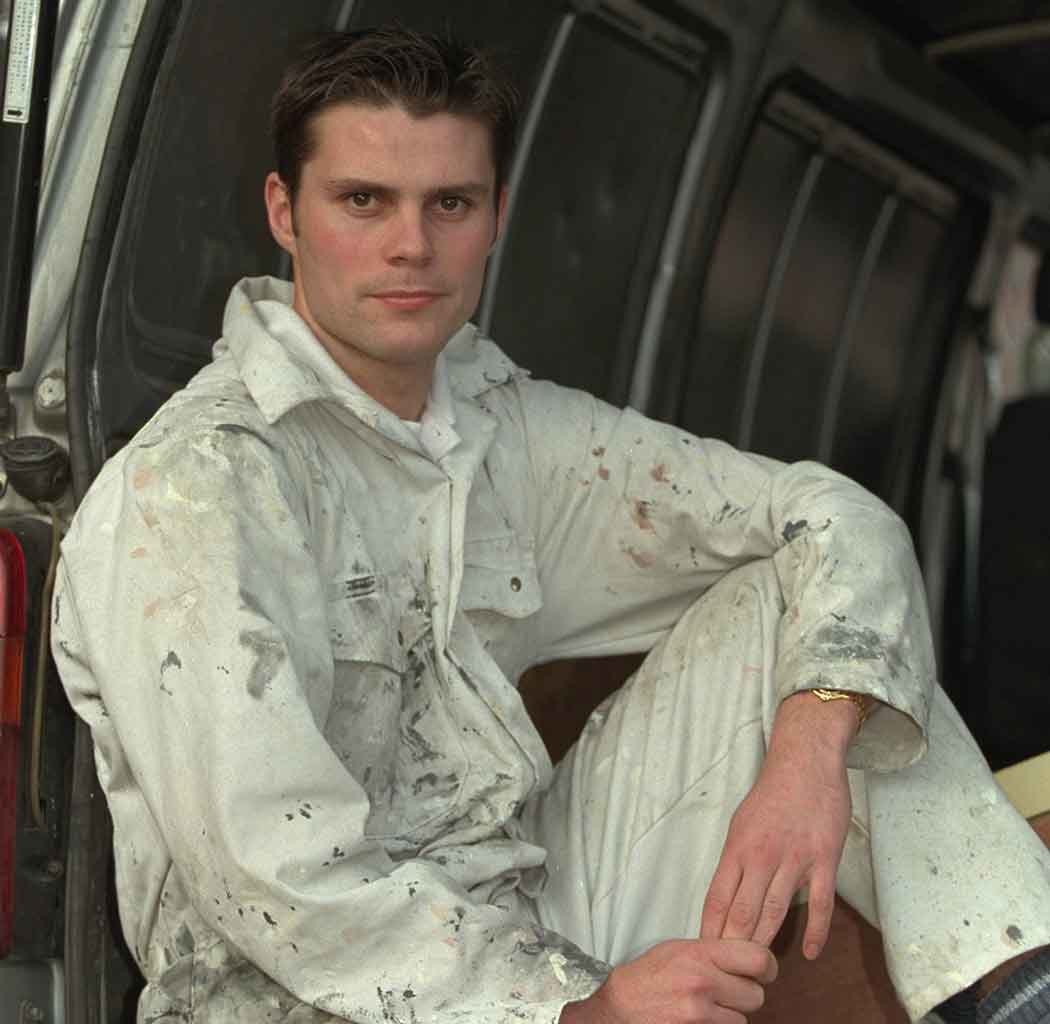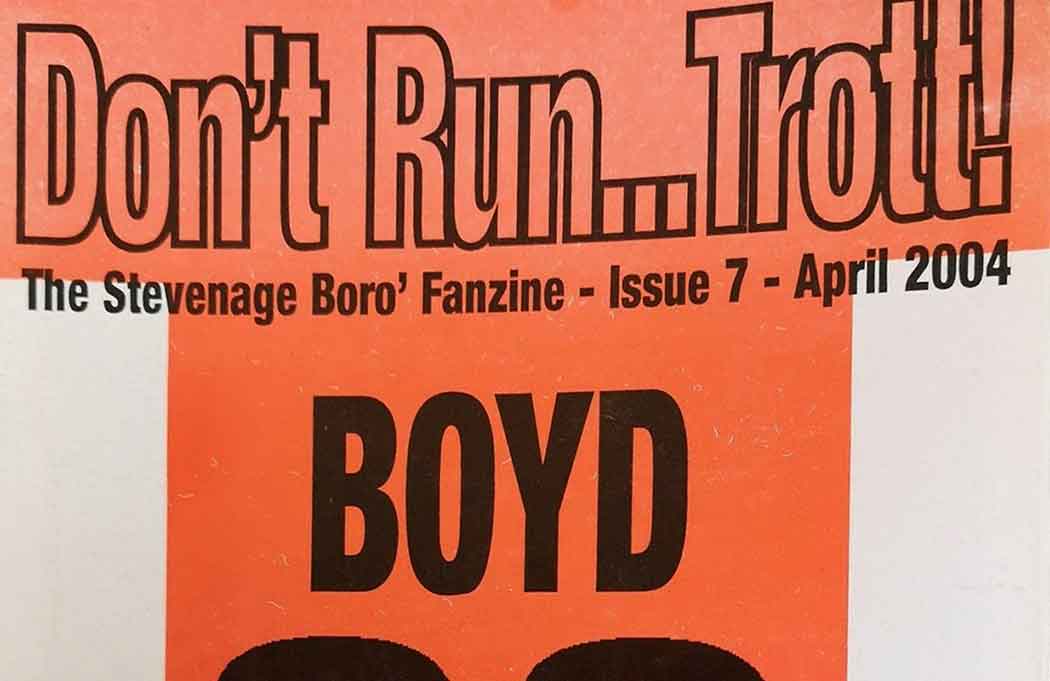As far as we know, only two lads are now forever immortalised in the name of a Boro’ fanzine: Martin Gittings and Robin Trott. Now, you surely don’t need us to go into the very obvious reasons why our record scorer had the honour of lending his name to Gitts Is Up. You can see why he was the muse for what was the terrace staple of the early 1990s. So, what about Trotty? How did the defender’s legacy end up including naming rights to Don’t Run… Trott and an all-star testimonial under the Broadhall Way lights?
Hold on.
Sorry – scrap that second bit.
Robin Trott: Why Is He A Cult Classic?

Trotty was pretty much up against it from the start of his Boro’ career. In Gitts’ most recent spell at the club, he was scoring for fun as we were winning pot after pot; rising fast up the pyramid in the process. For Trott, however, he came into a club that had fallen short at the end of the 1996-7 campaign. We’d tried in vain – but ultimately failed – to keep hold of our Conference title and take up our deserved place in the Football League.
We also came within 90 minutes of a Wembley appearance in the FA Trophy.
But the squad that had taken us to the top of the tree was starting to break up in summer 1997. Not going up had that impact. Barry Hayles left for Bristol Rovers. Efe Sodje opted to join Macclesfield Town; the side who beat us to the 1997 Conference title. Boro’ gaffer Paul Fairclough had to somehow dust us down and get us going again. That summer, in came Robin Trott as part of that rebuilding process; signed from Welling United.
Now, we’ve spent a long time talking about the background there. But it’s important. You need to see the context in which Trotty came to us. One era was ending. And Trotty was going to have to help build the next one.
Looking back, the 1997-8 season was one of transition. Understandably so. We’d lost an array of talent. But Trotty rose to the challenge; featuring 51 times in a campaign where the FA Cup gave us a ray of light in an otherwise mundane season. He took on the armband too; him and Smudger leading from the front from the back (if that makes sense). But the drama that would provide the backdrop to his Boro’ career was about to kick into gear.
Robin Trott: One constant in a time of change
The start of the 1998-9 campaign saw Trotty out of the starting XI with the signing of Lee Howarth. But he fought back to regain his place in the side; seeing more game time after Cloughie was fired by Victor Green and replaced by Richard Hill. He started the 1999-00 season in fine fettle too. But a long-term injury meant he missed a large chunk of the winter. He was absent for five whole months between November and April as Hill’s era spluttered and splatted to its end. In came (and out went) Steve Wignall. Still, Trotty was there.
He put in the legwork, committed himself to the cause, and laid it all on the line.
But this was a Boro’ battling with an identity crisis. After eight years with Cloughie at the helm, we’d gone through two bosses in as many years. Phil Wallace had come in – and back came Cloughie in summer 2000. Trott played more times than any other defender during the 2000-1 campaign. Yet, the same can’t be said for the 2001-2 season. In fact, the defender’s time with us looked to be up in autumn 2001; his first team opportunities becoming limited as the season took shape.
The defender put in a transfer request and PW said: “I told him I didn’t want to accept – but he was insistent I placed him on the [transfer] list. Trotty encompasses everything that’s good about this football club. We’ve therefore put a five-figure sum on his transfer, which should deter anyone who is calling with a passing interest.”
It worked.
After winning his place back in the team, Trott signed a new deal in February 2002. PW was jubilant, explaining: “I turned down three bids and kept talking to him, hoping he would change his mind and I’m delighted he has. The centre pairing of Rob and Jason Goodliffe… is as good as anyone could want at this level. They’re both honest, genuine lads who… will give 100% for the club. We don’t want to lose people like that.”
Robin Trott: Epilogue
And so Trotty stayed and played – even after Cloughie left. As forgettable as the Wayne Turner era is, the Orpington lad was an essential part of the team that got to the 2001-2 FA Trophy final. Of course, Cloughie set those wheels in motion. He kept plugging away even as the whole edifice crashed down during the 2002-3 season. And, as he’d done in past years, he helped steady the ship after Turner became the latest gaffer to move on.
In early 2003, times were a-changing. Boro’ were moving into full-time territory as a club and Trotty’s day job as a painter-decorator meant he couldn’t commit to those demands. And the arrival of Graham Westley in February that year was almost a natural conclusion to his time with us. After being part of the Boro’ team that lost 3-0 at Tamworth in the FA Trophy, he never played for us again. This wasn’t, of course, helped by the fact that GW brought an entire back four with him from Farnborough. Only Jason Goodliffe survived.
Now, it’s not a nice note to end on. But let’s look at it another way. Robin Trott is the link between two distinct Boro’ eras. He helped Cloughie rebuild after the disappointment of 1996-7; guided us through the Newcastle epic as our skipper; and stayed constant as we rumbled through managers in search of renewed success. And his utter diligence and true professionalism helped to steer us into a new era of full-time football.
GW picked up the reigns and Trott’s time at Broadhall Way had run its course. One fact you should remember is this: when Trotty fell out of favour, he soared back into it. No-one blags their way to 190+ appearances. Even if the true total should have been more than 200. And now you can start to get why his name adorns a fanzine. At the time, Trotty underlined the best of our club – even if on-field results didn’t necessarily look amazing on paper.
That’s not just us cracking out the hyperbole either. Phil himself said it too, as you’ll see quoted above. It’s just a genuine shame that we didn’t get to cherish his service or mark his departure in a more fitting way. But that’s not something we need to revisit now…

Our thanks to the Stevenage Football Archive for matchday programme information.



